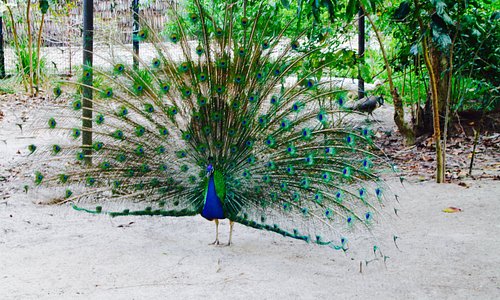The Zanzibar Archipelago, located in the Indian Ocean 15 miles off the coast of Tanzania, is a breathtaking spot to escape from the world. You’ll enjoy clear, turquoise-blue water; shallow sandbars perfect for wading; and many small, nearly deserted islands virtually unvisited by tourists. Explore the World Heritage Site of Stone Town, Zanzibar City’s old quarter. Or just go beach to beach between tiny fishing villages—each one's better than the next.
Zanzibar is a semi-autonomous part of Tanzania in East Africa. Located just 20- 50km off the coast of mainland, this archipelagio(group of islands) consist of many small islands and two large ones: Unguja(main) and Pemba(Zanzibar city), numbering a total of 51 islands. The name Zanzibar is derived from a combination of two Arabic words ‘Zenj’ meaning black and ‘bar’ which eans land resulting in the ancient title ‘Land of the blacks’. Pemba is also known as Al-khudra "The Green Island” by the Arabic mariners
Zanzibar is the ultimate Indian ocean destination with its historical Stone town(a World Heritage site) and beaches to die for.
Zanzibars tourism industry has been on the rise in recent years and is famous for clove production.Zanzibar cultures became more diverse in its range, more unique in its expression. Zanzibar is the birthplace of Swahili, a lingua franca forged from global dialects, upon which legends were carried, trade routes opened and a Sultan’s empire prospered. It is here that the Africa Culture blended with other cultures mainly Persian, Arabic and Indian to forms Swahili Culture. Today the romance, the splendor and legends of the past are still vibrantly alive, traditional sailing dhows, carved wooden and doors, chests, the scent of the clove and the smile of the hospitable people welcomes you to Zanzibar.
Information & Facts
Activities
Zanzibar is world famous for its sultry sandy beaches filled lined with palm trees and resorts. From simple cottage to 5 star luxury resorts these islands have it all and more. Go diving, snorkeling and take sunset cruises on white sailed dhows.You can also dine on the finest seafood.The festival does not involve killing of bulls and it is often held at the end of the clove harvest or on the Zanzibar revolution day. (12th January).
Dhow (traditional wooden boats) cruises are very popular in Zanzibar the views from theses boats are timeless and refreshments are served. Marine parks such as those in Chumble Island are prime spots for deep sea fishing, diving and snorkeling which offers underwater cliffs, wrecks, canyons, caves and spectacular reefs where visibility is normally in excess of 20m. The aquatic life within these waters is often very prolific and one usually sees moray eels, scorpion fish, lion fish, large groupers, octopus, lobsters, rays and, occasionally, and manta rays and dolphins.
Climate
Zanzibar has a predominant tropical climate due to its location close to the equator. The islands are warm all year round and short showers are common in November. Longer rains occur in March through may. Loose clothing and hats are advised for visitors new to the country.
The northern monsoon (known as Kaskazi in Kiswahili) lasts three to four months from December to March. The South west monsoon (Kusi) lasts from April to November. The rainy seasons (Masika) starts in March or April and lasts in May. June to October is the dry season and temperatures are clement. There are short rains known as Vuli. Zanzibar gets about 60 inches of rains annually. The maximum temperatures are 88.50F in February and 810F in July. The minimum temperatures are 800F in March and 710F in June.
Getting Around
Transport in Zanzibar is mainly by road, with the private DalaDala being the only kind of public transportation.There are five ports in all the islands of Unguja and Pemba and are all operated by the Zanzibar Ports Corporation
Language
Zanzibaris are of diverse ethnic origins and speak Swahili (Kiswahili). Local Residents also speak French or Italian.
Money
The official currency is the Tanzanian Shilling (Tsh)
Restaurants
With Zanzibar known as the ‘Spice Islands’, it’s little surprise that spices play an important role in the cuisine here. With African, Arab, Goan, Indian and Chinese influences, traditional food is truly a fusion experience. Most restaurants feature spices in their menus although there are also Italian, Thai and other international establishments for those looking for something a little closer to home!
Bars can be found in Stone Town and in many of the hotels and restaurants around Zanzibar Island.
Shopping
As you stroll through Stone Town , you will find several shops selling wood carvings, Zanzibari chests, clothes, spices, jewellery, paintings and antiques. Most of the gift shops are situated along Kenyatta Road in Shangani, and Gizenga Street behind the Old Fort. Tourists are advised not to buy any products related to protected species on the islands, such as sea shells and turtles. A holiday to Zanzibar would be incomplete without visiting these souvenir shops.
Sightseeing
Visit the Spice plantations for cloves, nutmeg, cinnamon, pepper and many other spices. The Jozani natural forest is home to the rare Red Colobus Monkey and the Zanzibar leopard. Situated on the southern point of the island, Kizimkazi fishing village is home to several schools of bottle-nosed dolphins which can often be sighted following a short boat trip from the village. If you are lucky, you may be able to swim quite close to the dolphins.
GALLERY






